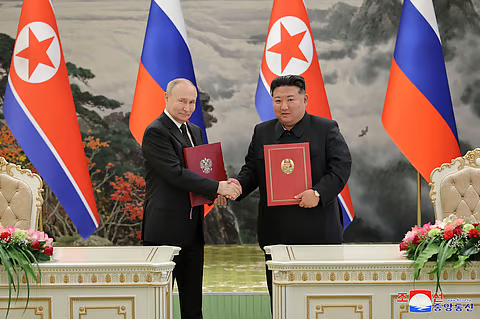
- Russia and North Korea had signed a Comprehensive Strategic Partnership Treaty that included a mutual defence clause—if either country was attacked, the other would support them.
- Under the pact, North Korea sent over 12,000 troops and labourers to support Russia’s war in Ukraine, which includes deminers and construction workers.
- This pact marks a change in global power alignments, reinforcing a bloc of authoritarian states.
It has been a year since President Vladimir Putin visited North Korea, making it his first visit in over 24 years. The visit came at a very important time for both countries, as they are both isolated from the world. Russia has been diplomatically isolated from other countries due to its ongoing war with Ukraine, and North Korea has also been facing crippling sanctions and isolation due to its continued nuclear weapons development. Extravagant displays of military pageantry accompanied Putin’s visit. Putin had described the new pact as one that promises a “multipolar world order”.
Analysts had signalled that this agreement was more than just symbolic; it could mean a military alliance, arms sharing, and technology transfers. This alliance could also be read as a trend of authoritarian solidarity against Western-led alliances like NATO and the QUAD. However, this alliance posed a fear of sanction violations, especially if North Korea starts supplying arms to Russia.
President Putin was welcomed in Pyongyang with a lavish military ceremony, showcasing North Korea’s military might. Both countries had signed a Comprehensive Strategic Partnership Treaty. The treaty included a mutual defence clause- if either country was attacked, the other would support them. Other than that, multiple agreements had also been signed between the two countries on military, space technology, energy, and trade cooperation. Putin had also conveyed his gratitude to Kim Jong Un for his support for Russia in the war with Ukraine. Statements of both nations highlighted their shared opposition to US-led alliances. This pact made a crucial shift from friendly ties to a formalised military alignment.
Under the pact, North Korea sent over 12,000 troops and labourers to support Russia’s war in Ukraine, which includes deminers and construction workers. North Korea has supplied Russia with millions of artillery shells, ballistic missiles, and military hardware. In return, Russia has provided North Korea with advanced technologies like air defence systems, satellite support, and possibly nuclear-related technology. The countries have also set up an arms-for-oil arrangement, which violates UN sanctions. Diplomatic exchanges of high-level officers have also increased, with Russia’s Sergei Shoigu visiting North Korea three times in 2025.
Amid growing partnerships between the two nations, Russia has also resumed direct passenger train service with North Korea after years of inactivity. The US, South Korea, and Japan have condemned the alliance, warning of increasing destabilisation. There are growing concerns about the formation of a Russia-Iran-North Korea axis. China has also been closely monitoring the situation. The alliance has moved from a symbolic alignment to active military cooperation.
This pact marks a change in global power alignments, reinforcing a bloc of authoritarian states. It underscores the growing divide between the West and the anti-West coalitions in a multi-polar world. What’s left to see is whether this coalition between Russia and North Korea is sustainable.
References
- https://www.reuters.com/world/asia-pacific/russian-presidential-security-official-shoigu-arrives-north-korea-reports-tass-2025-06-17/
- https://www.aljazeera.com/news/2024/5/24/japan-south-korea-announce-sanctions-over-russia-north-korea-arms-trade
- https://www.reuters.com/world/asia-pacific/north-koreas-kim-met-russias-security-official-shoigu-kcna-reports-2025-06-17/
- https://beyondparallel.csis.org/timeline-of-north-korea-russia-cooperation-since-2022/
- https://www.reuters.com/world/russias-putin-visit-north-korea-june-18-19-2024-06-17
Archita Gaur is a postgraduate student at the School of International Studies, JNU. She specialises in the World Economy and has a strong interest in public policy, economic research, and governance. The views expressed are the author’s own.
